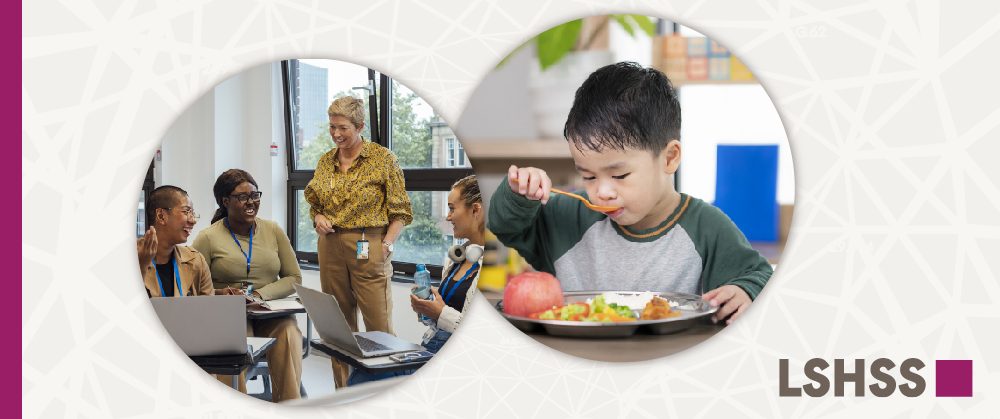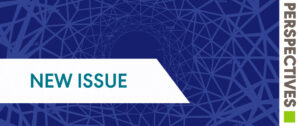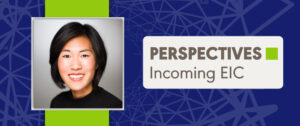The latest issue of Language, Speech, and Hearing Services in Schools (LSHSS) features two forums focusing on key topics for school-based speech-language pathologists (SLPs): (1) creating individualized education programs (IEPs) and (2) working with children who have feeding disorders.
Learn more about the forums below.
Assessing Students and Developing IEPs
In the first forum, Guest Editors Marie Ireland and Shannon Hall-Mills provide school-based SLPs with 10 articles on developing and implementing IEPs in schools. The guest editors open the forum by discussing IEPs and the current need for clinical information for school-based SLPs before introducing the articles.
Two articles can help SLPs evaluate students who may have disabilities before they have an IEP in place. Power-deFur’s tutorial starts at the special education assessment, walking SLPs through federal requirements and showing how these requirements can be implemented to meet the needs of all students. Next, Sylvan et al. look at how SLPs in schools balance and prioritize providing direct support to students while following the prevention-oriented framework known as the Multi-Tiered System of Support (MTSS).
Once the team decides to develop an IEP for a child, they should consider the student as a leader on the IEP team, as McNaught and colleagues highlight in their tutorial. Murza and Buckley also focus on a student-centered approach, showing SLPs how to use critically inclusive thinking during IEP development. Although conflict during the IEP planning process cannot be avoided, Abell guides team members on engaging during conflicts, highlighting opportunities to build trust and to find opportunities for innovation.
As the process of IEP development continues, Heilmann et al. emphasize the importance of providing students with inclusive learning in the general education environment whenever possible. Later, Powell and colleagues show IEP teams how to use data to link IEP goals with local curriculum to increase academic achievement. Elsewhere in the forum, Marante and Hall-Mills found that school-based SLPs have a wide range of expectations and beliefs about how vocabulary goals fit into IEPs.
Once an IEP has been developed, Woods and colleagues demonstrate how SLPs—and the entire IEP team—can use IEPs as a data source to help spot trends and improve existing models. Then, Carlin shows SLPs how a workload management approach may lead to more successful IEP implementation compared with a caseload approach.
We hope that school-based SLPs can use the information in this forum to better help students achieve their goals through working with their IEP teams. In addition, the editors highlight unique new research directions and opportunities to better inform practice.
Working With Children Who Have Feeding Disorders
Next, Guest Editor Memorie Gosa presents the latest evidence-based practice for school-based SLPs who treat patients who have pediatric feeding disorders. Emily M. Homer introduces the forum with a brief history of the incorporation of pediatric feeding disorder as part of a school-based SLP’s scope of practice; then, she summarizes the articles in the forum.
After the introduction, Dawson and colleagues show how a team-centered approach is necessary to address the feeding and swallowing needs of students in public schools; they also discuss the SLP’s role on that team. Next, D’Angelo describes a holistic feeding and swallowing evaluation in a school setting, with the school-based SLP as the leader of an intradisciplinary team.
Part of the holistic approach discussed throughout this forum includes incorporating family and cultural considerations when getting families involved in treatment, as discussed next by Villaluna and Dolby. Then, Power-deFur advises clinicians on using federal statutes and regulations to better work within their teams to help children with dysphagia receive the services they need.
A tutorial by West demonstrates current best practices for treating children with pediatric feeding disorder in order to support their participation in relevant educational activities. Meanwhile, an article by Garcia goes over the anatomy and physiology of feeding and swallowing for school-based SLPs.
The forum ends with an epilogue by Gosa highlighting the importance of providing SLPs in schools with the latest evidence-based research on pediatric feeding disorder. Gosa ends the article with a call for further clinical–research partnerships and graduate training in pediatric feeding disorders.
Evidence-Based Practice for School-Based SLPs
We hope that these forums provide ASHA’s school-based SLPs with new ideas and methods that they can bring into their sessions with students. We’d like to thank Drs. Ireland, Hall-Mills, and Gosa for their work bringing these forums to LSHSS readers—and to ASHA members at large.
For more than 50 years, LSHSS has been a key resource for ASHA members working in schools. The entire archive is available online, and new issues are published quarterly, providing clinicians with the tools that they need to help students succeed.
To hear more about the forums from all three guest editors, check out the related videos below! You can read both forums, as well as nine additional articles, in the latest issue of LSHSS, or explore the articles in the forums at the end of this post.
Related Videos
Explore the Forums
Developing and Implementing IEPs for Children With Disabilities in Schools: Current Processes, Models, and Research
Abell, G. (2024). Conflict engagement for individualized education program team members. Language, Speech, and Hearing Services in Schools, 55(2), 381–388. https://doi.org/10.1044/2023_LSHSS-23-00093
Carlin, C. H. (2024). Workload versus caseload: An exploratory comparison study of individualized education program progress and other outcomes. Language, Speech, and Hearing Services in Schools, 55(2), 259–275. https://doi.org/10.1044/2023_LSHSS-23-00075
Heilmann, J. J., Bertone, A., & Wojtyna, A. (2024). How inclusive practice increases the educational relevance of individualized education programs. Language, Speech, and Hearing Services in Schools, 55(2), 231–248. https://doi.org/10.1044/2023_LSHSS-23-00088
Ireland, M. C., & Hall-Mills, S. (2024). Empowering speech-language pathologists: Strategies for effective individualized education program navigation and inclusive practice in schools. Language, Speech, and Hearing Services in Schools, 55(2), 225–230. https://doi.org/10.1044/2024_LSHSS-24-00026
Marante, L., & Hall-Mills, S. (2024). Exploring speech-language pathologists’ perception of and individualized education program goals for vocabulary intervention with school-age children with language disorders. Language, Speech, and Hearing Services in Schools, 55(2), 368–380. https://doi.org/10.1044/2023_LSHSS-23-00078
McNaught, J., Biegun, D., & Swartzentruber, K. (2024). Student-led individualized education programs: A gateway to self-determination. Language, Speech, and Hearing Services in Schools, 55(2), 276–302. https://doi.org/10.1044/2023_LSHSS-23-00079
Murza, K. A., & Buckley, P. C. (2024). Using a social model to guide individualized education program development and change educational paradigms to be critically inclusive. Language, Speech, and Hearing Services in Schools, 55(2), 323–335. https://doi.org/10.1044/2023_LSHSS-23-00081
Powell, R., Schultz, J., Harvey, R., & Meaux, A. (2024). Maximizing student outcomes in schools: Data-driven individualized education program goals and objectives aligned to the standards. Language, Speech, and Hearing Services in Schools, 55(2), 303–322. https://doi.org/10.1044/2023_LSHSS-23-00082
Power-deFur, L. A. (2024). Special education assessment: Practices that support eligibility and intervention. Language, Speech, and Hearing Services in Schools, 55(2), 336–348. https://doi.org/10.1044/2023_LSHSS-23-00077
Sylvan, L., Kingsley, H., Bartolett, G., & Gouck, M. (2024). A balancing act: How school-based speech-language pathologists navigate their efforts related to individual education plans and multi-tiered systems of support. Language, Speech, and Hearing Services in Schools, 55(2), 349–367. https://doi.org/10.1044/2023_LSHSS-23-00073
Woods, A. D., Ireland, M. C., Murphy, K. A., & Lancaster, H. S. (2024). Go beyond compliance: Use individualized education programs to answer strategic questions and improve programs Language, Speech, and Hearing Services in Schools, 55(2), 249–258. https://doi.org/10.1044/2023_LSHSS-23-00084
Pediatric Feeding Disorder and the School-Based SLP: An Evidence-Based Update for Clinical Practice
D’Angelo, E. C. (2024). Clinical feeding and swallowing evaluation for the school-based speech-language pathologist. Language, Speech, and Hearing Services in Schools, 55(2), 409–422. https://doi.org/10.1044/2023_LSHSS-23-00019
Dawson, M. L. W., Neal, A., & West, K. (2024). Go team go! Interprofessional practice for pediatric feeding in the schools. Language, Speech, and Hearing Services in Schools, 55(2), 394–408. https://doi.org/10.1044/2023_LSHSS-23-00017
Garcia, R. (2024). What school-based speech-language pathologists need to know about pediatric swallowing and feeding development and disorders. Language, Speech, and Hearing Services in Schools, 55(2), 458–468. https://doi.org/10.1044/2023_LSHSS-23-00030
Gosa, M. M. (2024). Pediatric feeding disorder and the school-based SLP: An evidence-based update for clinical practice: Epilogue. Language, Speech, and Hearing Services in Schools, 55(2), 469–472. https://doi.org/10.1044/2023_LSHSS-23-00175
Homer, E. M. (2024). Pediatric feeding disorder and the school-based speech-language pathologist: An evidence-based update for clinical practice. Language, Speech, and Hearing Services in Schools, 55(2), 389–393. https://doi.org/10.1044/2024_LSHSS-23-00011
Power-deFur, L. A. (2024). Legal issues and opportunities associated with serving children with pediatric feeding disorders in schools. Language, Speech, and Hearing Services in Schools, 55(2), 434–443. https://doi.org/10.1044/2023_LSHSS-23-00018
Villaluna, A., & Dolby, C. (2024). Dysphagia service delivery in the educational setting: Pediatric feeding disorder and the culturally responsive clinician. Language, Speech, and Hearing Services in Schools, 55(2), 423–433. https://doi.org/10.1044/2024_LSHSS-23-00042
West, K. M. (2024). Treating pediatric feeding disorders and dysphagia: Evidence-based interventions for school-based clinicians. Language, Speech, and Hearing Services in Schools, 55(2), 444–457. https://doi.org/10.1044/2023_LSHSS-23-00016







